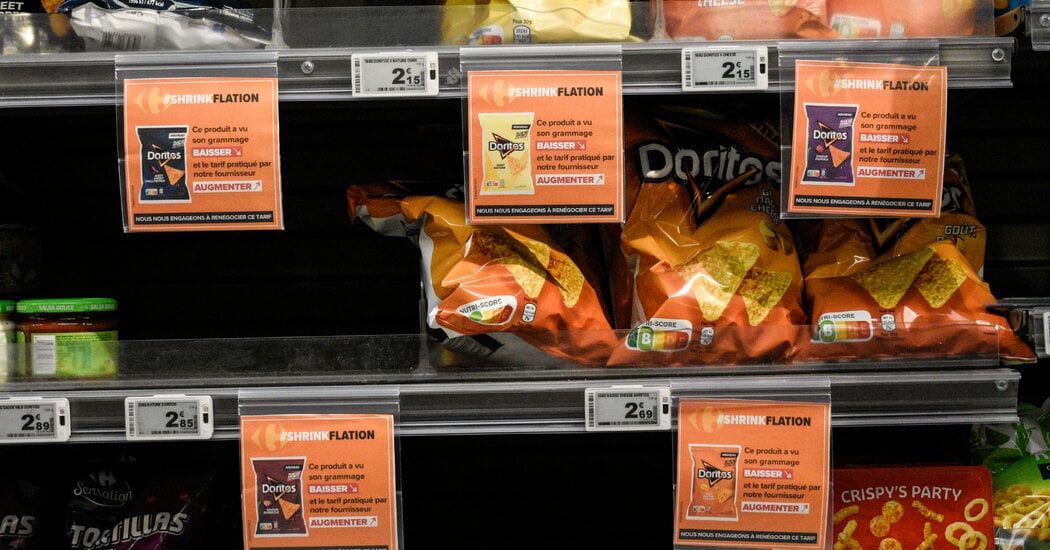- cross-posted to:
- [email protected]
- cross-posted to:
- [email protected]
I wish we had a small percent of what France does for its consumer rights in the United States.
That’s because we don’t set shit on fire every time the government looks at us wrong.
Perhaps it’s time to change that
Impossible when 30% of the country is addicted to a 100% propaganda channel
if that 30% were able to do so much damage, the other 70% can do even more.
The other 70% consider political activism posting memes on places like this.
Bringing awareness to issues (even through memes) is a good way to get people who are capable of fighting in on the fight.
What also tends to happen though is that when an issue gets popular, some people jump on the bandwagon for the dopamine hit that comes from the attention they get when they make content about the issue. Hell, even when they don’t make it. I’ve seen stickied comments on clips of popular music videos (just one ridiculous example) posted by fans where they’re saying shit like, “Oh my god guys! Thank you so much for all the likes and comments! I didn’t expect this to be so big!” Ummm, it’s a Beatles clip my guy. You didn’t do anything but reupload a bit of it in short form. You out here acting like you just a member of the band caught off guard by how many people like you.
I always have to be a dick and ask, “Oh, you made this?”
deleted by creator
The real reason the 2A exists and continues as-is: it lets those elites in control rile up the stupid masses (that they keep that way) to literally murder the people trying to fix how fucked up shit has become
deleted by creator
If our representative govt represented us, maybe…but it doesnt, so we wont.
thats why we actually gotta do shit
What’s great about this comment is that every side can say it about the other!
I agree, but it’s also worth noting the influence of police forces, riot police, swat teams, and the national guard.
The US basically has an occupying army to quell unrest in every county across the country, so it’s harder to properly protest without state retaliation. Not to say we shouldn’t do it, but I can understand people’s reticence.
If only they had a right to an armed militia ha ha ha ha ha
Fr. Leftists need to exercise their second amendment rights way more.
Plenty do. There just needs to be more organization.
You’re right. We have idiots setting themselves on fire in front of courthouses instead.
Oh so I’m guessing it did come out he was doing it for Trump? Because the one who did it in protest of the our support of Israel was looked at as a kind of a hero here.
The reporting I’ve seen was that he had been hanging around the courthouse for a few days and was obviously mentally unwell but he essentially thinks Biden and Trump are working together to establish a fascist state and it all heavily involves Peter Thiel. I didn’t read it but someone made a word cloud of his pamphlet and it was all over the place and even involved conspiracy theories of yore that have been supplanted by QAnon and vaccine stuff.
So, I guess bipartisan?
He threw conspiracy theory pamphlets in the air beforehand, so safe bet it was for Trump.
And vote for the wrong people
That’s why the French protest all the time. They fight for their rights.

To… Party?
He says rights plural, so it must be parties plural.
Corporations are people and people are allowed privacy, so corporations don’t have to tell you anything, pal!
THAT’S AMERICA BABY LOVE GETTING STEPPED ON AND ASK FOR MORE OR QUIETLY GET STEPPED ON AND GET MORE ANYWAY HOOOOOAH 🦅🦅🦅🦅🎆🎆🎆🎆
~(Help us)~
I think it’s lobbying. The US market is so big it pays off to lobby hard.
This has been the law in Brazil for more than 10 years now. We have lots of problems here, but at least our consumer protection laws are top notch. And, believe or not, they’re enforced successfully.
Thanks for sharing, it’s great tk hear and I didn’t know!
For real? I live in brazil and never noticed any warnings on price increases, or size changes…
I was wrong in one thing, it hasn’t been a thing for 10 years, but for 20. It was determined by the Minister of Justice, based on article 55 of the Consumer Protection Code. More here. I remember seeing some warnings on labels back when the rule was new. My opinion is that companies got smarter and realized that those warnings were damaging to their brands, so they just stopped with the practice of shrinking products, which is why you never noticed.
Será que é por isso que sempre tem aqueles avisos de “nova embalagem”? Ou talvez fique escrito nas letrinhas pequenas atrás? Nunca percebi algo assim, mas muito legal saber que essa lei existe!
edit: se pesquisar por “reduflação” no google imagens, aparecem vários exemplos disso. Estou impressionado que eu nunca via algo assim…
Really we just need to standardize sizes for consumer goods. For example: drinks can come in 250, 500, 750, 1000, and 2000 mL sizes. Sold soap must be sold in units of 100, 500, or 1000 grams. And so on…
But then you get shrinkflation in the product itself. Less emulsifiers in the soap, drinks with corn syrup replacing sugar, and powders like cinnamon cut with lead powder.
Not saying it couldn’t be done, just that businesses are really incentivised to find the loopholes and exploit them.
In Australia we call this “skimpflation” because they aren’t shrinking the final product, they’re skimping on ingredients to lower production costs.
It’s the bane of my existence because brands I know and love will change their ingredients without warning and without changing anything on the packaging (sometimes not even changing the ingredients list! If the ingredients list has always just said “starch” they don’t have to change anything going from arrowroot starch to cheaper potato starch)
I have allergies and I’ve bought two boxes of the same product at the same time, and had an allergic reaction to one, but not the other.
I used to always blame it on my housemates not washing the cooking utensils properly, but I now use separate cooking equipment and I clean down the kitchen before I start and cook at odd times so I’m the only one using the kitchen.
I’ve started emailing companies after my allergic reactions to determine if they have changed an ingredient, and 90% of the time they confirm they have changed the ingredients. Usually they put some PR spin on it about the new ingredient being more allergy friendly or sustainable (they don’t clarify “environmentally” so I assume they mean “financially sustainable for the profits of our company”)
Here they label this as “New Recipe!”. As if they’re somehow doing us a favour.
Oh gee I wonder what inspired you to change the recipe 🤔
They already do that. So no downsides for this proposal. There was some article some years ago about how the taste of things like cookies changed because they went for cheaper recipe.
Less emulsifiers in the soap, drinks with corn syrup replacing sugar, and powders like cinnamon cut with lead powder.
Standard formulas for a given product. Anything that isn’t 40% sugar drink is “immitation soda drink”. Anything that’s under-emulsified can’t be called real soap.
These are solvable problems at a regulatory level. But at some point, it may be more cost efficient to simply nationalize the under-performing industry. Perhaps Coca-Cola just can’t cut it making soda drinks anymore, and the firm needs to be broken up and devolved to the various states as State Soda Bottling Company
You are seriously underestimating the complexity of products and how easy it would be for them to skirt such legislation
It would be a massive endeavour for regulators which companies may bypass by industry… This is not the right approach
You are seriously underestimating the complexity of products
Again, if the regulation process becomes too burdensome, sometimes the only practical solution is nationalization.
Nationalize every food production branch? Hmmm sure, that’s simpler
Wouldn’t be the first time the US has had to bailout and restructure the agricultural industry.
Ask John Steinbeck
I don’t think this is the ideal situation. The way food prices are advertised needs to be standardized: € / kg or $ / freedom unit. + size + unit price. I think it’s already the law in EU, but supermarkets try to hide the per kg price in a tiny almost unreadable printsize.
We all need to apologize to France for literally every mean thing we ever said about them.
We used to have standardized package sizes in the EU for things like butter, chocolate, etc. So stupid to give that up
I guarantee it’s because of neoliberals and conservatives trying to emulate The US.
It was in the name of customer convenience and individualism of course. Think of the singles!
But luckily, we now have guidelines on how crooked a banana has to be to not be thrown into the trash!
That is what a respectable government looks like
It feels a bit “least we could do” ish?
They’re not setting standard size scales for basic products or establishing price floors based on wholesale/production costs, much less intervening to increase supply or reduce overhead costs.
This is a bit like the surgeon generals warning on a pack of cigarettes. Nice, I guess. But hardly a game changer.
Meanwhile in America
Haha big business go brrrrrr
I feel it’s a good first step.
It’s a third or fifth step. They already have laws against wastage, throwing out food, etc.
good ol’ name and shame!
Here’s my attempt at copying the article for readers:
To Fight ‘Shrinkflation,’ France Will Force Retailers to Warn Shoppers
- Merchants will be required to put signs in front of all products that have been reduced in size without a corresponding price cut.
For months, the shelves of Carrefour, France’s biggest supermarket chain, have been dotted with bright orange signs placed in front of Pepsi bottles, Lays potato chips and a variety of other foods whose packages are suspiciously smaller than they used to be.
“Shrinkflation,” the signs say. “This product has seen its volume decrease and the price charged by our supplier increase.”
On Friday, the French government took steps to require every food retailer in the country to follow suit. By July 1, stores will have to plaster warnings in front of all products that have been reduced in size without a corresponding price cut, in a bid to combat the consumer scourge known as shrinkflation.
“The practice of shrinkflation is a scam,” Bruno Le Maire, France’s finance minister, said in a statement. “We are putting an end to it.”
The government is also encouraging shoppers to act as informers, urging those “who have doubts about the price per unit of measurement displayed on the shelves” to flag it to the authorities via France’s consumer reporting app.
The fight against the practice of downsizing products without also downsizing their prices has picked up in the United States, where President Biden has shamed food companies for raising prices even as inflation cooled.
Shrinkflation has become a point of outrage for shoppers in France, and a political issue for President Emmanuel Macron as consumers continue to grapple with a cost-of-living crisis. Although inflation has recently come down in Europe from the record highs of a year ago, the prices of many food products remain elevated.
Inflation in the eurozone fell to a new two-year low in March, the result of an aggressive campaign of interest rate increases by the European Central Bank. European governments had also worked to ease prices for energy and food, through subsidies for electric bills and by negotiating with food manufacturers to force prices down.
In France, inflation has fallen now more than a third from a year earlier, but higher food prices have been persistent. A typical basket of food basics that includes items such as pasta and yogurt is 3 to 5 percent higher than it was a year ago, after a 16 percent surge for 2023.
Mr. Macron had promised to wrestle food costs down further this year. The government moved up annual price negotiations between suppliers and retailers in February, and put pressure on companies to limit increases.
The shrinkflation campaign is the latest weapon. Stores will have to display signs for two months after downsized products have been put on their shelves, according to the government decree issued Friday. The signs will appear near a variety of goods made by food companies, as well as for the supermarket’s private-label brands, from snacks and soda to bags of rice and laundry detergent. Prepackaged foods, like shrink-wrapped deli cold cuts or foods sold in bulk, will be exempt.
Many global consumer goods companies have raised prices by double-digit percentages in the past year, attributing the increases to higher costs of ingredients and labor. Even so, many of those companies have reported expanding profits as they sell fewer items at higher prices.
The issue came to a head in France last year when Carrefour announced that it would no longer sell PepsiCo products because the prices were “unacceptably” high for consumers, escalating a showdown by French retailers to name and shame brands that were not reducing prices as inflation eases.
As part of its campaign, Carrefour also put up shrinkflation posters next to products like Lipton tea warning shoppers that they were paying a higher price for a product whose volume had shrunk.
France has submitted a proposal to the European Union that would force food retailers throughout Europe to carry out a shrinkflation labeling campaign.
-Merchants will be required to put signs in front of all products that have been reduced in size without a corresponding price cut.
What’s to stop the manufacturer reducing the item by, for example, 10% in size, and 2% in price?
I’d hope that’s covered by the definition of corresponding, though I am neither French nor a legal expert so I can’t say for sure.
I would think that would be covered by the corresponding price cut part. If they are smart they put in a clause that says the price cut has to be proportional or bigger otherwise it is considered shrinkflation.
I think the unit price should be more prominent than the price per item.
And the units should be consistent. It drives me nuts when I’m in a store and the unit varies across different sizes of the same product.
Who the fuck even knows what the unit price of paper towels is?!
Turns per roll on one brand, grams per inch for the next, and ounces per half-roll for your third choice.
And each brand has a different tear-off square size. Some have ‘jumbo size’ and also ‘pick-a-size’ where its smaller rectangles tear offs instead of squares.
How do you compare? You dont and its by design
Weight…
At this point I just stopped buying chips. Feels like such a waste to fill the bag less than half way…
good for you. Not really a necessity anyhow, have some nuts, it’s better for you.
Nuts are crazy expensive though unfortunately
Have some roasted edamame, unfortunately they taste a bit shit though.
I have some toasted chick peas, they taste great, but they dry my mouth out so fast.
deleted by creator
deleted by creator
When it was boiled?
as though God is a cruel, exploitive being who’s big on dog-eat-dog
The Christian god definitely is. I don’t know where Christians got the idea of a loving god but it wasn’t from their bible.
I was thinking about this the other day when I noticed my deodorant was 2.7fl oz instead of the usual 3. The stores are complicit. They know every time something shrinks because they have to print new tags. Even if it’s the old price, the unit price has changed, and I believe the barcode is different.
No warnings. No heads up. Just silent acceptance. Sure, if they posted a warning I wouldn’t buy that product but dammit I need deodorant!
Look up the lyrics to “If I Had A Rocket Launcher” for instructions on how to deal with this kind of theft.
I’ve never heard this song before but I fucking love it.
Is this guys other stuff like this or can you recommend other similar themed songs?
US market: Just puts one big sign outside that has an “everything” warning.
Warning: capitalism.
This seems like a great idea and i wouldn’t mind it getting expanded to become an EU wide norm.
That said it only adresses part of the problem. Another way consumers get tricked are recipe changes to substitute expensive ingredients for cheaper ones. And this one also subverts the mandatory kg/€ (or litre/€) price notices, which in a way already help with identifying shrinkflation. Although prominent warnings would help a lot fighting the psychological tricks involved in shrinkflation.
Personally i would also like laws to go even further and make it mandatory for companies to maintain public databases with product sizing and ingredients. Although i assume it wouldn’t be easy to fight against companies trying to subvert such system and claiming that near identical products are something new rather than just a new worse version of something existing.
On that note i also miss the more standardized portion sizes we had here in Germany for a lot of products. Actually something that sadly had to be abolished due to eu regulations, which at the same time at least seemed to have given us the already mentioned kg/€ price labels.
I had to jog my memory with this article (in german) from 2009 when the change apparently happened. An example it gives is that e.g. sugar (up to a size of 1kg) could only be sold in portions of 100, 250, 500, 750 und 1000g. So no trickery with random inbetween sizes. Obviously not a huge problem with something like sugar, but it similarly also applied to something like chocolate bars. Which nowadays come in the most random, constantly changing weights.
Maybe a bit heavy handed, but i wouldn’t mind fighting shrinkflation in some areas by simply forcing standardized sizes.
I don’t think it’s heavy handed. Shrinkflation fucks in recipes. One recipe calls for condensed milk. Due to shrinkflation I have to buy two cans and throw half of one away.




















